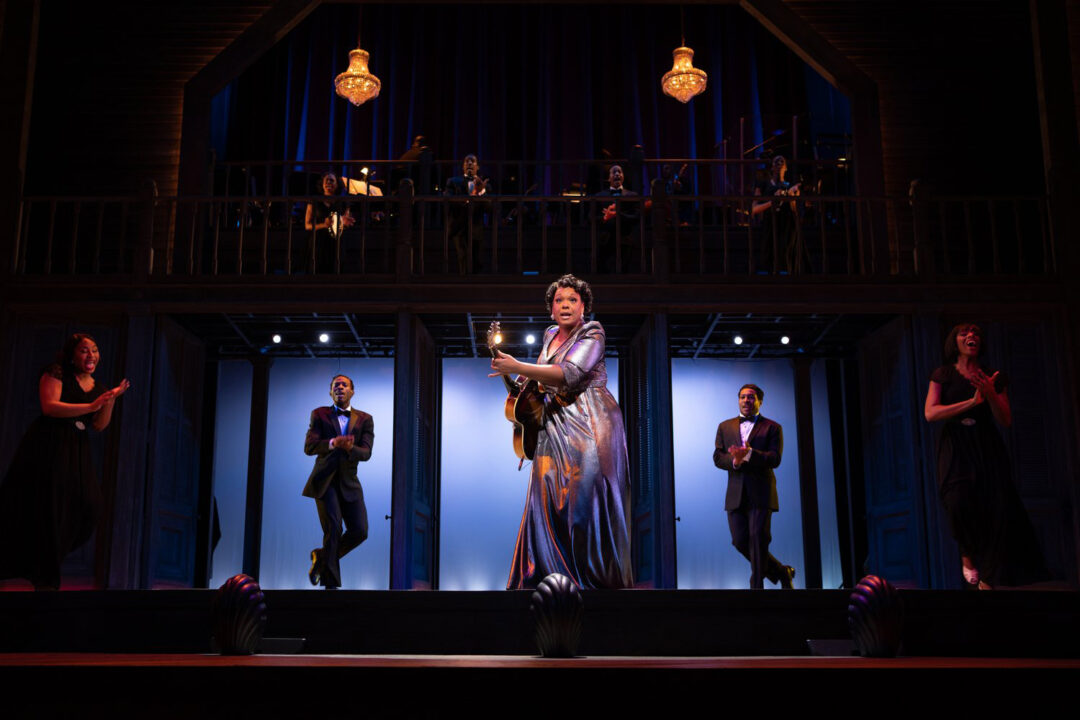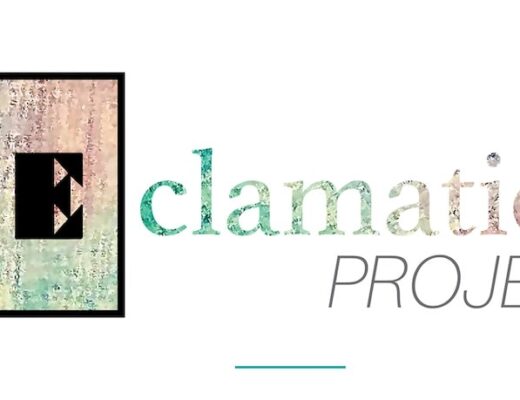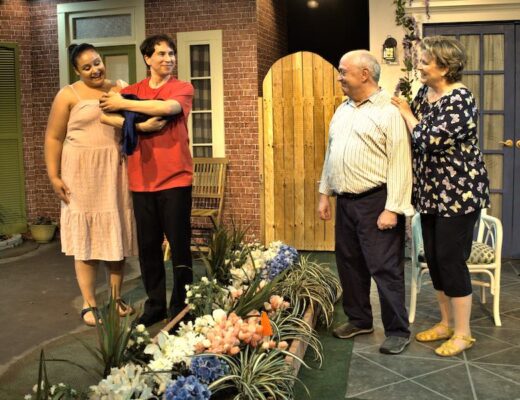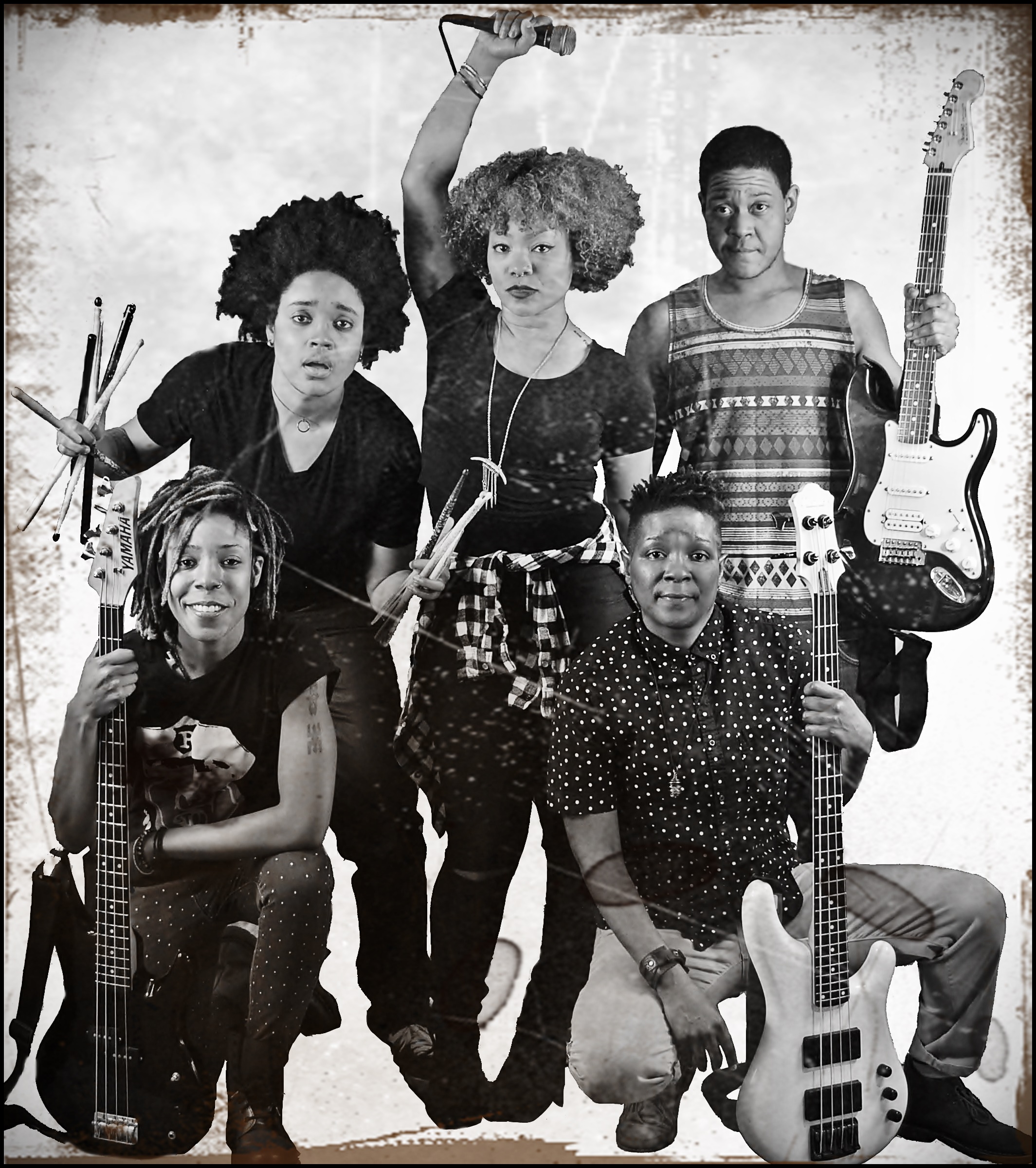By Vivian Thurman
This article was produced within the New Theater Critics project, a component of Day Eight’s 2023 arts journalism conference.
This article was originally published in DC Trending here.
It’s not often that a night at the theater leaves you feeling like “you’ve been to church.” This raucous bio-musical now playing at Ford’s Theatre follows the pioneering life of Sister Rosetta Tharpe (1915-1973) and bares the soul of a talented and influential, “guitar-shredding” woman ahead of her time.
Sister Rosetta is played by Broadway alum Carrie Compere (The Color Purple, Holla If Ya Hear Me), whose voice alone could blow the roof off of the historic Ford’s Theatre. Rich with resonance and gritty at times, Compere’s vocal stylings weave together the church-based gospel of Arkansas with the secular jazz-blues-devil’s music of Chicago (circa 1935-1945). Sister Rosetta was known for “rockin’ the R’s” and the “duck walk.” Compere mastered both.
Shout Sister Shout! is based on the award-winning book, “The Untold Story of Rock-and-Roll Trailblazer Sister Rosetta Tharpe” by Gayle F. Wald. The stage adaptation is written by Cheryl L. West, a widely recognized playwright whose works include Akeelah and the Bee, Pullman Porter Blues, and the Charles McArthur award-winner for Outstanding play Before It Hits Home.
The storytelling narrative comes in the form of a series of flashbacks. Memories evoke strong emotions when Rosetta’s mother disowns her for singing anything other than gospel. Sister Rosetta’s guitar playing style was an early influence to rockabilly artists like Jerry Lee Lewis, Johnny Cash, Chuck Berry and others. Known as the Queen of Strings, at the height of her popularity in Europe, Rosetta was asked who was most influential in developing her musical personality. Was it Elvis? “I’ll tell ya about your Elvis,” she said, implying her originality was her own.
The strongest influence in Sister Rosetta’s life was her mother, Katie Bell (played by Carol Dennis), a traveling evangelist who pushed a young Rosetta to accompany her on the guitar in church. And later, encouraged her to “look down that road” for a higher calling. Carol Dennis, whose credit includes performing in the original Broadway cast of The Color Purple, balances the domineering and opinionated love of a single mother. The vocal powerhouse and the on-stage chemistry of Compere and Dennis is satisfyingly explosive.
A complicated love life in search of happiness has Sister Rosetta marrying three times. But it was her risky relationship with Marie Knight (played by Felicia Boswell) that gave her a deep sense of happiness like nothing she had known before. Marie, a stunning and accomplished pianist, is played for Mahalia Jackson.
The live orchestra is set on an elevated deck playing double duty as the Big Band in some of the showcase numbers. The hidden orchestra music performances such as the gospel “Glory, Glory, Hallelujah,” the bluesy “Lonesome Road” and the uptempo “On My Way” are guided by the skillful baton of Victor Simonson, also plaing the keyboard. Orchestration and arrangement by Joseph Joubert expertly highlights everything from the subtle guitar solos, the piano and voice duets to the eight member band’s toe-tapping accompaniments. Much credit goes to Sister Rosetta who wrote most of her own songs.
A notable mention must be made for the costume design by Alejo Vietti and the wig and make-up design by Charles G. LaPointe. This design team immediately sets the time period with soft curls and simple dresses on young Rosetta, as well as well-fitted suits on the various gentlemen. With each chapter in Sister Rosetta’s life, her concert dresses become more sophisticated. Her jewelry and fur coats set a regal presence that could be felt as she entered a room or arrived on a stage.
The ensemble is filled with talented singers and dancers playing multiple roles. During gospel songs that required jubilant expression from the choir, this critic found that the hyper exuberant choreography stole focus. The choreography was aerobic at times but well-rehearsed, which was perfectly suited for the Nicholas Brothers, and Cab Calloway’s “Jumpin’ Jive.” Choreography is by award-winning William Carlos Angelo.





No Comments